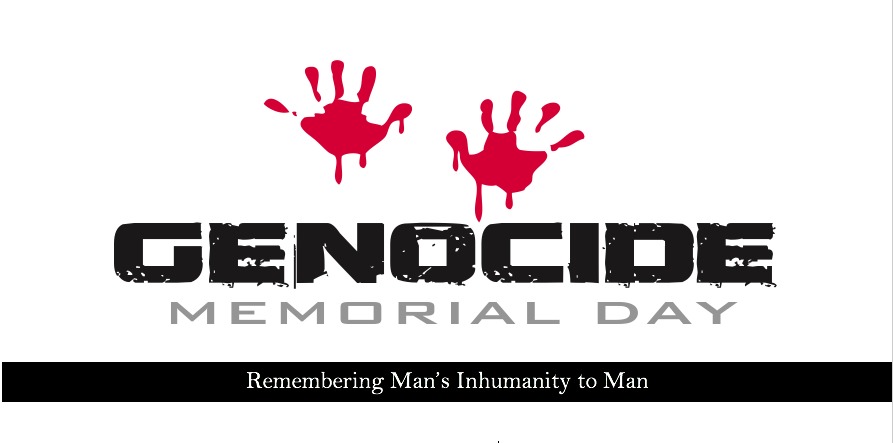On Sunday, 15th January 2023, the Islamic Human Rights Commission (IHRC) held its annual Genocide Memorial Day which featured a number of speakers, all of whom were experts in the fields of international conflicts, human rights and decolonial studies.
WATCH THE FULL EVENT:
This year’s GMD 2023 was hosted online on IHRC TV, YouTube and Facebook, with over 500 views combined worldwide. It was opened up by Nargess in the presence of Raza and Prof Ramon Grosfoguel.
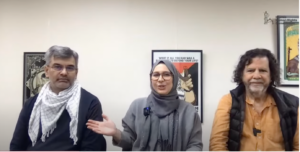 She thanked everyone for joining in before going into the history of IHRC’s Genocide Memorial Day project and why this initiative was started; “To commemorate past and present genocides and to commemorate genocide prevention.” Before going on to explain how GMD has expanded into other countries, she then went on to explain this year’s theme: “Demonisation and Otherisation of Minorities”. Then, she went on to briefly explain how right-wing rhetoric can cause genocide. She introduced the main speakers of the event which were Prof Ramon Grosfoguel, Prof Richard Falk and Dr Ghada Karmi. Nargess emphasised the point that this event was an interactive event and that viewers could send their questions. She ended by going over some ground rules and the agenda for the event.
She thanked everyone for joining in before going into the history of IHRC’s Genocide Memorial Day project and why this initiative was started; “To commemorate past and present genocides and to commemorate genocide prevention.” Before going on to explain how GMD has expanded into other countries, she then went on to explain this year’s theme: “Demonisation and Otherisation of Minorities”. Then, she went on to briefly explain how right-wing rhetoric can cause genocide. She introduced the main speakers of the event which were Prof Ramon Grosfoguel, Prof Richard Falk and Dr Ghada Karmi. Nargess emphasised the point that this event was an interactive event and that viewers could send their questions. She ended by going over some ground rules and the agenda for the event.
The event began with a recitation of the verses from Surat An-Nisa by Wajahat Ali and translation read by Fatima Merchant.
Nargess then handed over to Raza who gave a more detailed explanation of IHRC’s Genocide Memorial Day Project. He was clear that the GMD project was founded in order to “eradicate Genocide, Genocidal acts and the culture that could lead up to Genocide from the narratives of our world.” He went on to explain how the rise of Hindutva and the ongoing issues currently affecting many communities around the world highlight the need for the GMD in order to prevent future genocides as one of the aims of the GMD project is to raise awareness about current genocides so that future generations can learn from the warning signs of current genocides. After explaining the aims and objectives of the GMD project, he handed the microphone back to Nargess who then proceeded to host the event.
She then introduced Prof Ramon Grosfoguel. Below is an excerpt of his talk.
Prof Ramon Grosfoguel said, “We see how there are very few spaces around the world to discuss these things. For example, look at the daily genocide that is going on in Palestine today, against the Palestinians. I think that the presentation of Raza is a good way to think about decolonising genocide studies and decolonising this thing we call genocide because, in fact, there is a memoricide, the destruction of the memory. Empires love to talk about the genocides of competing Empires, but they don’t want to talk about their own genocides.”
Prof Grosfoguel’s talk highlighted the connections between rhetoric, racism, labour exploitation, settler-colonialism and genocides and how we are living in times where fascist movements have become normalised.
Once Prof Grosfoguel finished his talk, Nargess opened up the floor for discussion on the themes touched on by both Ramon and Raza and how these themes connect with the issue of Genocide. The discussions undertaken by both Prof Ramon and Raza explained how the dangerous rise of right-wing rhetoric has affected communities on the state level and who profits from the status quo.
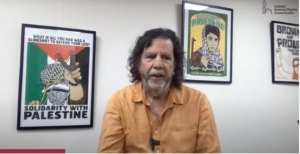
Nargess then proceeded to introduce Dr Ghada Karmi. A brief excerpt of her talk is below:
“Genocide as most people understand it, they understand it as, you know, gas chambers, extermination camps, people who are killed en masse, because they are a particular race or ethnicity. However, genocide includes another aspect which is the one that I think, applies to the Palestinians. And that is the aspect of destroying a group who are defined as racially inferior or not wanted. And so, you destroy them not by mass killings but by killing off their presence in historical terms, in denying them their memories, making their lives very difficult so that they leave of their own accord from the area that you don’t want them to live in and also, of course, killing them but not in the gas chambers or something like that. Now it is very clear that this form of genocide is the genocide that Israel is practising against the Palestinians.”
Dr Karmi’s talk briefly explained two aspects of how genocide applies to the Palestinian people, firstly by explaining the cause of the Israel-Palestine conflict and describing Israel’s systemic erasure of the Palestinian people and its blockade of the Gaza strip as a form of genocide and secondly, she went on to describe what is going within Israel due to the new Israeli government. She started this by saying the following:
“In so far as they have contributed members to become ministers in the new government, obviously there is a more intolerant, more oppressive, conduct in anticipation of what the new policies are going to be. But one can actually talk about, can actually say, that somebody comes from such and such a party, but you know, it’s not something that people are probably going to retain. What I think is important is to explain what this means for the Palestinians?”
She emphasised the point that the policies of the new government will simply be a continuation of the previous Israeli government in regard to the Palestinians, even though this new government might have some distinct features that separate it from the rest, including involving individuals who want to “finish off 1948.” She then further explained how the Palestinians have reacted to the new government and what we need to do to build solidarity with the Palestinian people.
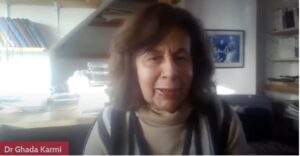
Nargess then opened up the floor for Q&A in regard to Dr Ghada Karmi’s talk, where both she and Prof Ramon Grosfoguel answered questions related to online shadow banning to genocides occurring in the Middle East.
After the Q&A, Nargess explained that every GMD has a minute of remembrance for those who died in previous and ongoing genocides. This section was hosted by Fatima Merchant, who explained the purpose of this remembrance before reading out the various genocides that have occurred and starting off the minute silence. Please, read the list of genocides below and here.
Nargess resumed hosting the event after the minute silence, where she explained why Prof Richard Falk couldn’t join online due to technical issues he had at his end and then explained what other resources there are for activists who are interested in the work of GMD. She then passed the floor on to the chair of IHRC, Massoud Shadjareh, who closed the event with some final remarks on the work done by IHRC.
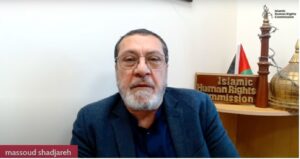
This is an important event about genocide prevention and would be of interest to all those interested in politics and anti-racism work. You can watch the event here.
A special thank you to our supporting organisations:
Inminds Human Rights Group
Decolonial International Network
Bruxelles Panthères
Neturei Karta International
Muslim Public Affairs Committee, UK
Malaysian Consultative Council of Islamic Organisation-
Citizens International

